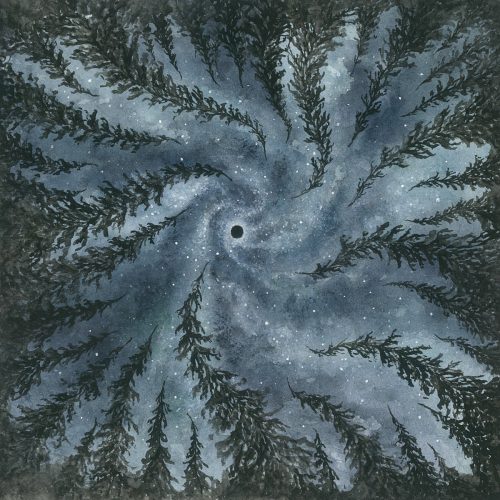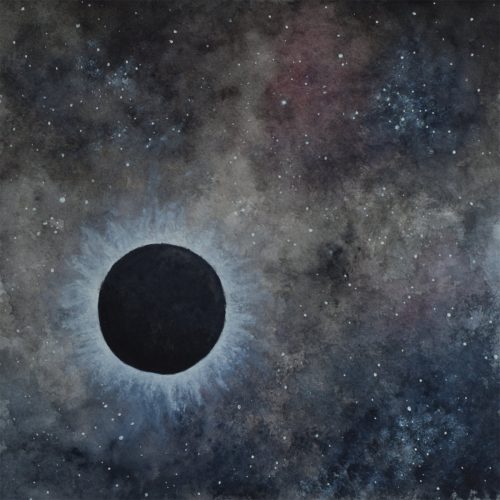
(Andy Synn combines two reviews in this post, one each for the latest two releases by the Australian band Mesarthim.)
If you want to upset a wide swathe of the Metal and Metal-adjacent public, just play them something by Atmo-Black Trance duo Mesarthim.
Too spacey and synth-driven for most of the Black Metal scene, too upbeat and dancey for the Dungeon Synth crowd, and too abrasive for the Synthwave crew, the duo’s (incredibly prolific) output has proven to be exceptionally divisive over the years, even as it has also attracted an incredibly dedicated fanbase who can’t seem to get enough of the band’s signature blend of bleeps, bloops, and blasts.
That being said, I know I’m not the only one who felt like the group’s most recent works – most notably 2018’s Coma Wall EP and last year’s Ghost Condensate album – didn’t quite achieve the same sense of balance and equilibirum between the various disparate elements of their sound (although not for lack of trying) which helped define the band’s earlier works.
Which makes the recent surprise release of The Degenerate Era, the fifth full-length Mesarthim album in five years, an opportunity to reset and reassess things… for both the band and their fans.
Beginning with ambitious three part opener “Laniakea”, I think it’s safe to say that Mesarthim have rediscovered a fair bit of the magic which made their first several releases so impactful, as the fusion between the metallic and electronic elements feels more natural here (if “natural” is really the right word for such a synthesised and computerised sound) than it has for several years.
A lot of this, at least from where I’m sitting, comes from the band’s willingness to embrace a surprisingly upbeat and dreamlike aesthetic this time around, as while there are certainly some dark-sounding riffs scattered throughout the record, you’ll notice that the melodies, whether they come from keys, synths, or shamelessly showboating lead guitars, possess an almost euphoric vibe to them that’s quite at odds with Black Metal’s traditional doom ‘n’ gloom aesthetic.
Speaking of… what hamstrung the band’s last couple of releases, from my perspective anyway, was the way it often felt like the duo were going against their own natural inclinations, either by trying to rein in their more blissed-out side, or by forcing it to co-exist, awkwardly, alongside a much more “traditional” (stretching the word a little bit there) Black Metal approach.
This time, however, there’s greater balance to the force, whether it’s in the way that the head-nodding grooves and soaring leads of “Laniakea Pt. 2 (Zone of Avoidance)” function in perfect harmony with the song’s swathes of pseudo-symphonic keys and sparkling electronica, or the way the atmospheric texture of the guitars offsets the artificial flavour of the synths during “Time Domain” (which also features another wicked, unashamedly epic, guitar solo).
There are still moments of darkness of course. The title-track, for example, is a moody slow-burner, with some nicely doomy, overtones, which eventually transitions into an impressively brooding and blast-fuelled (not to mention somewhat Mare Cognitum-esque) second half, while the first half of “Paradox” (before it transforms into a full-on space-rave) definitely takes a few cues from Mysticum along the way.
But, ultimately, it’s the band’s willingness to recognise that they’re at their best when they’re reaching for the stars, rather than trying to stay grounded, which has reinvigorated this record, to the point where even the most hardened of metal elitists will have a hard time refusing or refuting the hypnotic appeal of a song like “618”… especially since, whether they’re willing to admit it or not, it goes a long way towards showing how the sort of early Black Metal synth-work being referenced here was never really all that far removed from its dance/electro origins anyway!

BONUS FEATURE: PLANET NINE
Because the band have, once again, been ridiculously prolific (and because there’s a clever little reference to this EP’s title track buried at the end of The Degenerate Era’s final track, “618”, I thought I’d throw in a few quick words about their newest EP too.
Arguably an even more OTT release than its recent predecessor, Planet Nine may only be two tracks, but at fifteen-and-a-half minutes and ten-and-a-half minutes long, respectively, it’s still a fairly meaty morsel of electro-metal magic to swallow all the same.
As a matter of fact, the title track might just be the best song from either album or EP, as it’s not only simultaneously heavier and more danceable – coming on strongly like some sort of trip-hop meets breakbeat remix of Black Hole-era Samael – than any of its cousins, but also possibly even catchier and more shamelessly “epic” (is that an actual chorus refrain that comes in at 03:11, or do my ears deceive me?) than anything the band have done before.
And while “Burial” doesn’t quite reach the same heights, that’s largely because it has its sights set on a slightly different direction, and provides the listener with a more introspective, though in many ways no less intense, journey through cosmic fields of pulsing signals, solar winds, and rippling radio waves, all culminating in a soothing, synth-driven conclusion that allows your overstimulated senses a chance, finally, to rest.
It’s a welcome companion to The Degenerate Era’s more solemn, stargazing sound, and well worth picking up alongside its bigger brother if/when you get the chance to do so.

Hello. Long time reader, first time commenter. These two guys from Australia, whoever the fuck they are, are fucking brilliant, I like Blood Incantation and Cryptic Shift who are doing great things but
these lads properly get what space-themed metal should sound like: cold, alien, patient and LONG. Anyone who likes innovative heavy music should totally check ’em.